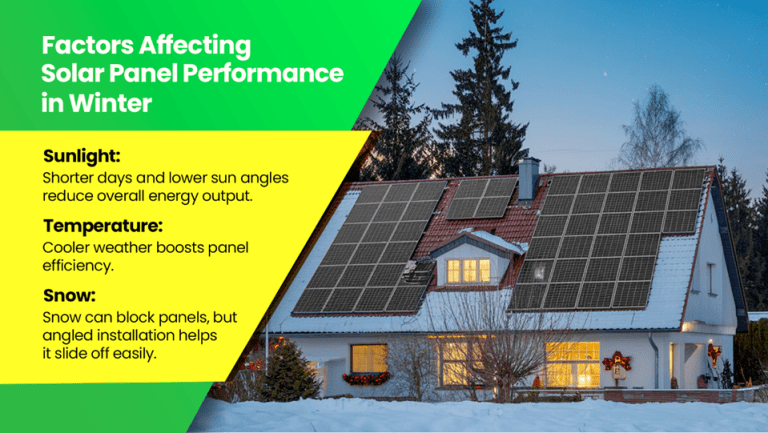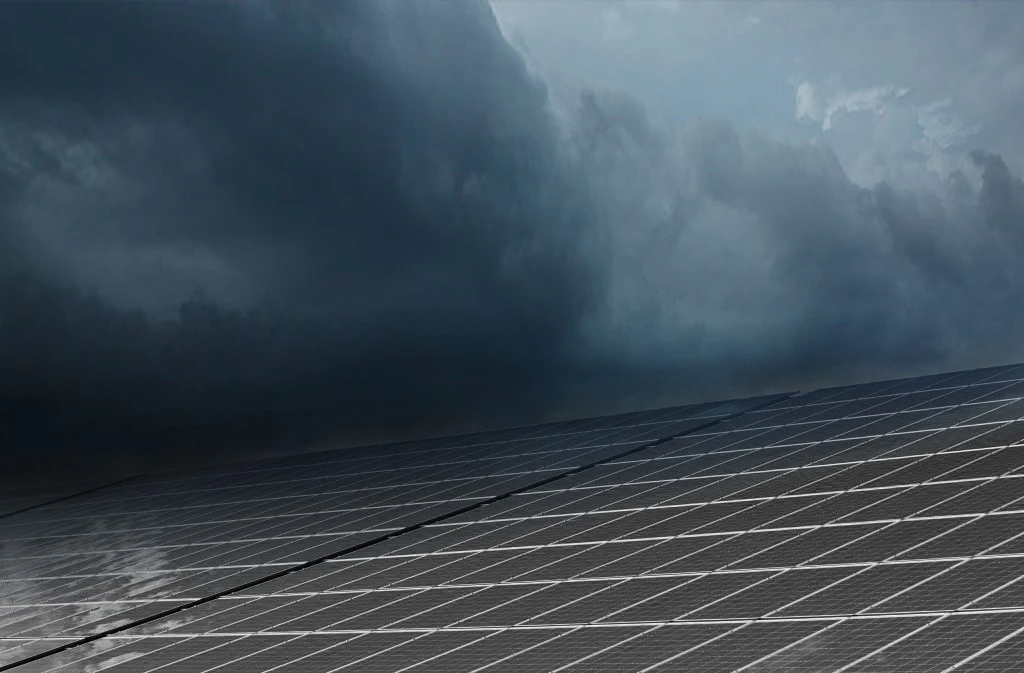- Updated On: October 1, 2024
Solar Panels in Winters:
Do They Work in the Cold Weather?
The trend of solar installation is rapidly booming in the U.S. However, a common question of homeowners is “Do Solar Panels Work in Cold Weather?” As winter approaches, people wonder about solar efficiency due to short days, snow, rain, and less sunlight. Also, there is a common solar myth that solar panels only perform well in summer which may confuse homeowners while investing in solar. In reality, solar panels continue to generate electricity during colder months. Even in some cases, they can perform better in cool weather than in scorching heat. Solar technology is continuously upgrading and today solar panels can withstand extreme weather conditions, from heavy snowfall, and hurricanes to icy winds.

In this article, we will explore how solar panels work in the cold weather. Also, we will highlight some tips for increasing your PV system performance in winter.
How do solar panels work in cold weather?
The silicon in solar panel photovoltaic cells gets excited when photons from the sun strike it. Your home’s electric distribution box receives the generated electric current, which powers your essentials. You can continue to use solar energy at night, during periods of high electricity consumption, or in a grid outage by storing some of it in a rechargeable solar battery.
One of the most popular myths is that solar panels work only in hot and sunny climates. Panels can produce more energy per sunlight hour during winters than during summers in optimal winter weather conditions. An analysis from the National Renewable Energy Laboratory (NREL) determined that solar panels performed far more efficiently during winter than summer in cold-weather states like Colorado.
What factors are impacting solar panel performance in winter?
Solar panels are less likely to achieve their maximum power or temperature in the winter. The factors affecting their performance in cold weather include:

Availability of Sunlight:
To generate electricity, solar panels require sunshine, not heat. There are sunny days during the winter when solar panels generate enough electricity to power homes. Shorter days along with the sun’s location in the sky can, however, result in less energy being produced overall than longer summer days.
Temperature:
The efficiency of solar panels is increased by cooler temperatures because silicon-based cells function better there than they do on hotter days.
Snow Accumulation:
Snow can cover solar panels, lowering the amount of electricity they can generate. On the other hand, solar panel installation at the correct angle helps in snow removal.
Does snow affect solar power in winter?
In the winter, snow accumulation can block sunlight to a rooftop PV array, and resultantly producing less power. However, some modern solar panel designs have slick surfaces that prevent snow accumulation. Moreover, the majority of solar panels are mounted at a tilt that makes snow melt and slide off fast. Also, snow that melts and slides off the panels helps clear away accumulated dust and dirt. This “self-cleaning effect” helps to keep the panels clean so they can receive maximum sunlight again.
How to mitigate long-power outages with solar power in winter?
Combining your home energy system with battery storage can power up your home in power outages. Battery backup systems store excess energy during the day for use at night or during long blackouts when there is no sunlight. Tesla’s Powerwall is among the top solar battery storage options, allowing homeowners to go through long winter nights with stored solar energy.
How to optimize your solar systems for winter?
To make solar panels work in the cold weather efficiently, here are some useful tips for a homeowner:

Install Panels at Optimum Angle:
If a solar power system is installed at the correct tilt, this helps the panels capture more light from the sun during winter. The high angle allows snow to move and the sun reaches low-horizon situations.
Adding a Monitoring System:
Using solar monitoring systems, homeowners can measure and verify performance throughout the winter months, alongside being able to identify potential problems. When a solar panel is covered in snow, typically the homeowner will be notified by their monitoring system to clear it out.
Pair with Backup Power:
When winter storms strike (or during the peak of hurricane season), solar power combined with a backup battery system is an asset that allows you to have electricity even when grid power is out for long periods.
In conclusion, winter is actually one of the best seasons to make the switch. Solar panels are more efficient in colder temperatures, and with the sun reflecting off snow, they can capture even more sunlight. Plus, winter installations often mean shorter wait times and the ability to maximize energy savings by spring. Also, pairing with a solar battery ensures uninterrupted power during long outages. So, take advantage of available tax credits and rebates and lower energy bills year-round with solar power. Solar panels work in cold weather, making it the perfect time to invest in a sustainable future.
If you are looking for the best solar installer, we can help you with tailored and affordable solar and backup solutions according to your power needs. Book a FREE consultation now!
Related Articles:
Installing solar panels is a huge investment. For many potential homeowners, the primary motivator to invest in a home solar system is the commitment to long-term savings.
If you are considering installing solar panels, you may wonder about “Do solar panels work on cloudy days? It’s actually a valid concern, especially if you’re living in a region where rainy or cloudy days are common.
Hurricanes are powerful natural disasters that can wreak havoc on buildings and destroy infrastructures causing economic and personal losses.



